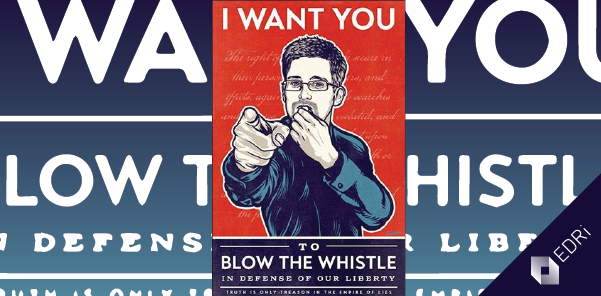Protecting whistleblowers – protecting democracy
Whistleblowing is defined as the “disclosure by a person, usually an employee in a government agency or private enterprise, to the public or to those in authority, of mismanagement, corruption, illegality, or other forms of wrongdoing”. Whistleblowers have become a trending topic since 2010, when Chelsea Manning disclosed around 700 000 military classified documents to Wikileaks.
Another famous case of document leak is the one by Edward Snowden, who in 2013 revealed to The Guardian and The Washington Post that mass surveillance was being carried out by the US National Security Agency (NSA). The NSA was spying indiscriminately on millions of private communications among worldwide users of telecommunication networks. The Snowden revelations triggered a global public discussion on mass surveillance and the right to privacy, and on the principle of transparency and democracy.
Snowden and Manning are the most famous whistleblowers, but many others have been front-line fighters in the battle for transparency and democracy. The problem with whistleblowing is that it is considered a serious crime in most countries, hence many whistleblowers pay a heavy personal price.
The legal global war on whistleblowing is played, on one side, by companies and governments, which are pressuring legislators for more severe punishment and more effective ways to prevent leaks. On the other side, civil society and human rights watchdogs are claiming more legal protection for whistle-blowers. In terms of legal protection, a welcome development is the work of the European Parliament Committee on Legal Affairs (JURI) on an own-initiative procedure regarding “Legitimate measures to protect whistleblowers acting in the public interest when disclosing the confidential information of companies and public bodies” (2016/2224(INI)). This initiative recognises the importance of whistleblowers as effective in protecting democracy.
As for the means, one practical example for the protection of whistleblowers was launched on 19 January 2017 at the City Council of Barcelona. The “Anti-Corruption Complaint Box” that is endorsed by the City Council was developed by a Spanish activist group Xnet. It makes use of GlobaLeaks, a free and open-source software that enables secure whistleblowing initiatives, developed by the Hermes Center for Transparency and Digital Human Rights. The platform uses Tor to guarantee the anonymity of the source of the leak.
The impact of whistleblowing in the EU policy arena has been remarkable. Thanks to Wikileaks, in 2016 the public was made aware of the issues presented in the draft proposals of strategic parties to the EU-US Trade in Services Agreement (TiSA). This allowed for civil society to intervene in a timely and effective way. This is just one example, but there are many others showing that whistleblowers can have an effective role in political decision making and, as shown by the TiSA leak, have been pivotal to bringing transparency into otherwise obscure management and decision-making processes.
Given the importance of whistleblowers in the fight for transparency and democracy, it is desirable that the EU creates a legislation that is not only good for Europe, but that also serves as an example for other countries that will learn from it. Such legislation should not only grant a high level of protection to whistleblowers, but also promote and incentivise others to contribute to the fight for transparency.

TheFreeDictionary: Whistleblowing
http://legal-dictionary.thefreedictionary.com/Whistleblowing
NSA Prism program taps into user data of Apple, Google and others (07.06.2013)
https://www.theguardian.com/world/2013/jun/06/us-tech-giants-nsa-data
Legitimate measures to protect whistle-blowers acting in the public interest when disclosing the confidential information of companies and public bodies, 2016/2224(INI)
http://www.europarl.europa.eu/oeil/popups/ficheprocedure.do?reference=2016/2224(INI)&l=en
GlobaLeaks
https://github.com/globaleaks/GlobaLeaks
HERMES Center for Transparency and Digital Human Rights
https://www.hermescenter.org/
Wikileaks: Trade in Services Agreement
https://wikileaks.org/tisa/
(Contribution by Tommaso Crepax, EDRi intern)


